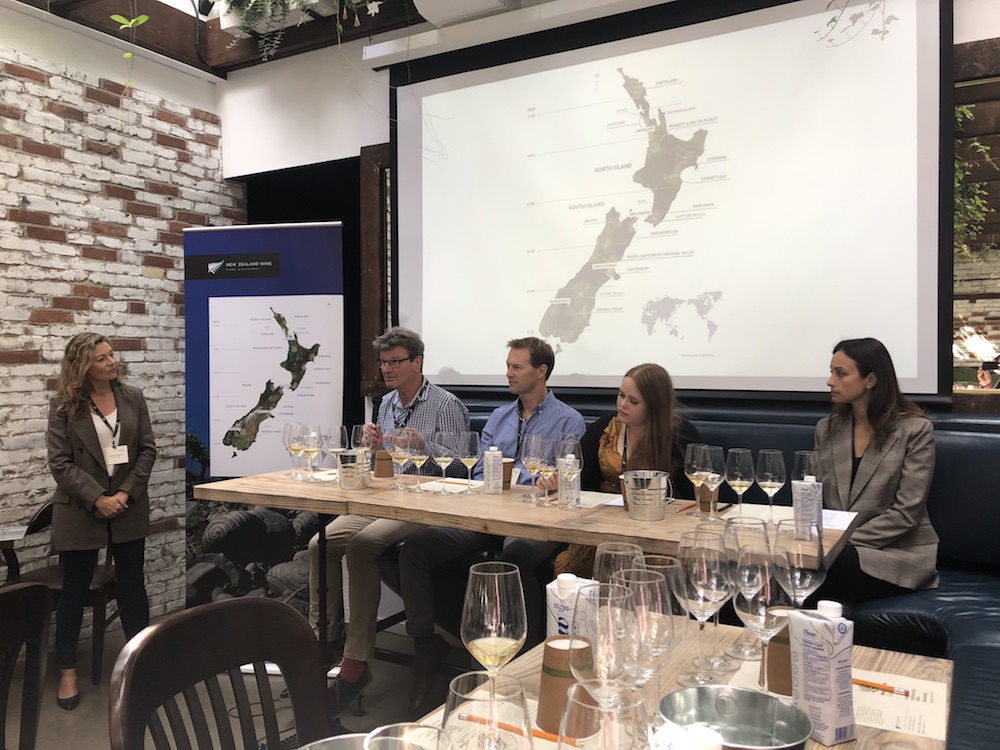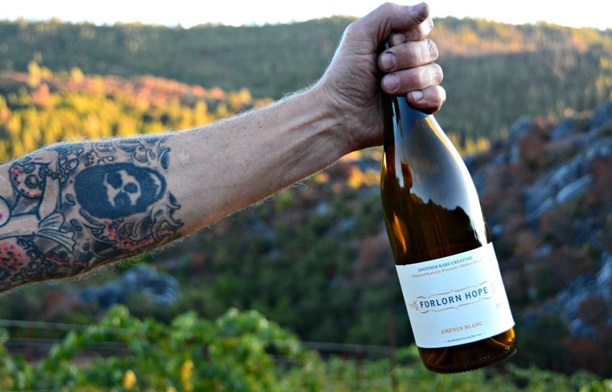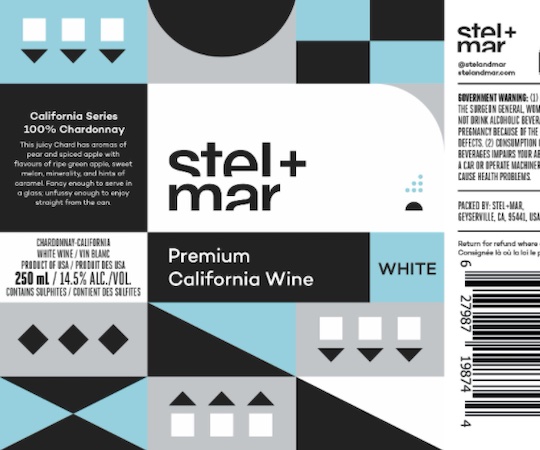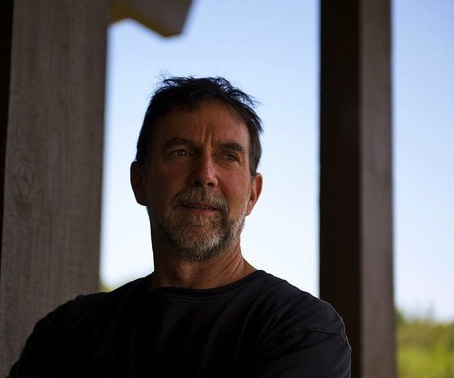
Jennifer Huether MS chairs a discussion about sustainability/tasting with Winemaker Kim Crawford (Loveblock Wine), Winemaker Nigel Sowman (Dog Point), Winemaker Arabella Waghorn (Astrolabe), and Sommelier Stephanie Guth (NZ’s Best Sommelier 2017).
When one looks at many a country’s (or a region’s) endeavours to integrate sustainability in their wine marketing, it’s pretty much par for the course that the more cynical amongst us wine writers will grumble something about greenwashing.
With this in mind, New Zealand Wine did a truly admirable job at their most recent Toronto tasting, and their efforts to earnestly “walk the walk” were most impressive. The QR code -reading app for tech sheets on each wine was most welcomed by those of us who prefer not to go home to the office with half-a-tree’s worth of literature, and I think that we all have more than enough USB sticks, thank you very much, plastic/tech waste and all that…
Jennifer Huether MS facilitated a fascinating panel-led tasting through a series of Sustainable, Organic, Biodynamic, and Natural Wines, with Winemaker Kim Crawford (Loveblock Wine), Winemaker Nigel Sowman (Dog Point Vineyard), Winemaker Arabella Waghorn (Astrolabe Wines), and Sommelier Stephanie Guth (NZ’s Best Sommelier 2017), who had unfortunately lost her voice.
Discussion began with an in-depth look at the commendable achievements of Sustainable Winegrowing New Zealand (SWNZ) since its inception in 1997 as one of the very first to be established in the international wine industry.
Developed to provide a ‘best practice’ model of environmental guidelines for vineyards and wineries, to guarantee better quality control from the vineyard through to the bottle, and to assure consumers that products are made with minimal impact on the natural and social environment, the SWNZ is indeed a laudable programme that many other wine-producing countries could take a serious lesson from.
Drawing from the organisation’s 2016 report, 98% of the country’s vineyards are now using monitoring techniques to optimise the application of water. With over 50 major rivers, 770 lakes, and a large number of underground aquifers, New Zealand is undeniably a water-rich country, but SWNZ recognises the importance of sustainable water management, making it one of the pillars of its sustainability mandate, alongside Biodiversity, Byproducts, Soil, Air, Energy, Pest and Disease Management, Energy, and People.
There’s certainly been a lot of thought put into the establishment of such a thorough system of certification, and it is refreshing to see the New Zealand wine industry’s embracement of this, although Nigel Sowman did joke that it was a bit of a “Volun-told” programme. To keep everything legit and above board wineries self-audit every year, with an independent audit occuring every three years. “There’s no fudging it” added Astrolabe’s Arabella Waghorn.
Dogpoint are New Zealand’s largest organic producer, and Sowman spoke of how heartening it was to meet producers at the recent 3rd Organic Viticulture Conference who were looking to integrate organic practices into their conventional vineyards, understanding that “organic certification may not be everyone’s cup of tea”. Saying that, 10% of New Zealand’s vineyards are currently certified Organic, and this is seen as a growing community year upon year, with 2017 numbers showing that organic wine exports were worth an estimated $46.5 million.
Kim Crawford smiled wryly and made the point that “You certainly don’t do organics for your balance sheet”, to nods and grins from the other two Winemakers. Crawford feels that over time one gets more consistent yields with organic viticulture, whilst certainly not the bumper crops possible with conventional agriculture. He sees organics as a long term plan, where one has to be constantly looking towards the future, and not looking for a quick return upon one’s investments. He then quoted organic wine pioneer James Milton when he said that it takes three years to get certification, and seven years to ask for forgiveness from your vineyards. So it’s a serious commitment to go down the organic route, and that’s without even touching upon Biodynamic certification.
Waghorn spoke of her concerns about the lack of biodiversity within the Marlborough region. As kaitiaki (guardians) of their environment, Waghorn spoke to her family’s efforts in this department and the establishment and support of richer biodiversity in and around their family vineyards.
Naturally (ha!) the conversation eventually turned to the topic of Natural wines, and Heuther caught me with my trousers down when she put me on the spot asking me about my thoughts upon the subject. Thankfully the sage wisdom of Alo’s Christopher Sealy added some substance to my mumbled ramblings. It was asked of the audience if they felt that New Zealand’s Natural wines were on the cleaner side of the Natural spectrum, and I recall that the majority of the room were in agreement.
The accompanying Huether-led tasting itself was really rather good, with some seriously compelling wines in the line-up. New Zealand Wine really excelled themselves in assembling 10 wines that were certainly off the beaten path, from Loveblock’s green tea-treated 2019 “Orange” Sauvignon Blanc, through Milton’s 2018 “Libiamo Field Blend” (Viognier, Riesling, Gewurztraminer, and Muscat), to Hans Herzog’s 2014 “Spirit Of Marlborough” Bordeaux clone, the wines were anything but dull, and a real breath of fresh air at such a tasting.
I came away from the presentation/tasting feeling that New Zealand’s efforts in sustainability and related certification are anything but the aforementioned greenwashing; quite the opposite actually. As I previously mentioned, other wine-producing countries could take a few lessons from Sustainable Winegrowing New Zealand.
New Zealand Wine are a Good Food Fighter.
Please support the businesses and organisations that support Good Food Revolution.

Edinburgh-born/Toronto-based Sommelier, consultant, writer, judge, and educator Jamie Drummond is the Director of Programs/Editor of Good Food Revolution… And that was a smashing tasting… great venue too!







